Enneadecagon
| Regular enneadecagon | |
|---|---|
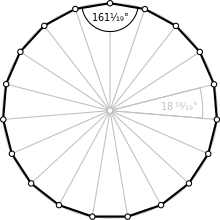 A regular enneadecagon | |
| Type | Regular polygon |
| Edges and vertices | 19 |
| Schläfli symbol | {19} |
| Coxeter diagram |
|
| Symmetry group | Dihedral (D19), order 2×19 |
| Internal angle (degrees) | ≈161.052° |
| Dual polygon | Self |
| Properties | Convex, cyclic, equilateral, isogonal, isotoxal |
In geometry an enneadecagon or 19-gon is a nineteen-sided polygon.[1] It is also known as an enneakaidecagon or a nonadecagon.[2]
Regular form
A regular enneadecagon is represented by Schläfli symbol {19}.
The radius of the circumcircle of the regular enneadecagon with side length t is (angle in degrees). The area, where t is the edge length, is
Construction
As 19 is a Pierpont prime but not a Fermat prime, the regular enneadecagon cannot be constructed using a compass and straightedge. However, it is constructible using neusis, or an angle trisector.
Another animation of an approximate construction.

Based on the unit circle r = 1 [unit of length]
- Constructed side lenght of the enneadecagon in GeoGebra = 0.329189180561468... [unit of length]
- Side lenght of the enneadecagon = = 0.329189180561467788... [unit of length]
- Absolute error of the constructed side lenght = 2.12...E-16 [unit of length]
- Constructed central angle of the enneadecagon in GeoGebra = 18.94736842105263...°
- Central angle of the enneadecagon = = 18.947368421052631578...°
- Absolute error of the constructed central angle = -1.578...E-15°
Example to illustrate the error
- At a radius r = 1 billion km (the light would need about 55 min for this distance) the absolute error of the side length constructed would be approx. 0.21 mm.
Symmetry

The regular enneadecagon has Dih19 symmetry, order 38. Since 19 is a prime number there is one subgroup with dihedral symmetry: Dih1, and 2 cyclic group symmetries: Z19, and Z1.
These 4 symmetries can be seen in 4 distinct symmetries on the enneadecagon. John Conway labels these by a letter and group order.[3] Full symmetry of the regular form is r38 and no symmetry is labeled a1. The dihedral symmetries are divided depending on whether they pass through vertices (d for diagonal) or edges (p for perpendiculars), and i when reflection lines path through both edges and vertices. Cyclic symmetries in the middle column are labeled as g for their central gyration orders.
Each subgroup symmetry allows one or more degrees of freedom for irregular forms. Only the g19 subgroup has no degrees of freedom but can seen as directed edges.
Related polygons
A enneadecagram is a 19-sided star polygon. There are nine regular forms given by Schläfli symbols: {19/2}, {19/3}, {19/4}, {19/5}, {19/6}, {19/7}, {19/8}, and {19/9}.
| Picture |  {19/2} |
 {19/3} |
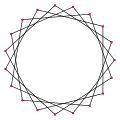 {19/4} |
 {19/5} |
|---|---|---|---|---|
| Interior angle | ≈142.105° | ≈123.158° | ≈104.211° | ≈85.2632° |
| Picture | 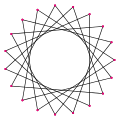 {19/6} |
 {19/7} |
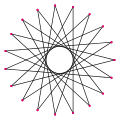 {19/8} |
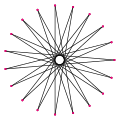 {19/9} |
| Interior angle | ≈66.3158° | ≈47.3684° | ≈28.4211° | ≈9.47368° |
Petrie polygons
The regular enneadecagon is the Petrie polygon for one higher-dimensional polytope, projected in a skew orthogonal projection:
 18-simplex (18D) |
References
- ↑ Borges, Samantha; Morgan, Matthew (2012), Children's Miscellany: Useless Information That's Essential to Know, Chronicle Books, p. 110, ISBN 9781452119731.
- ↑ McKinney, Sueanne; Hinton, KaaVonia (2010), Mathematics in the K-8 Classroom and Library, ABC-CLIO, p. 67, ISBN 9781586835224.
- ↑ John H. Conway, Heidi Burgiel, Chaim Goodman-Strauss, (2008) The Symmetries of Things, ISBN 978-1-56881-220-5 (Chapter 20, Generalized Schaefli symbols, Types of symmetry of a polygon pp. 275-278)
